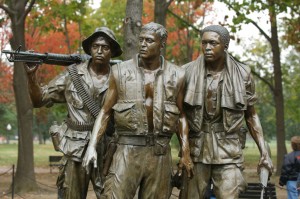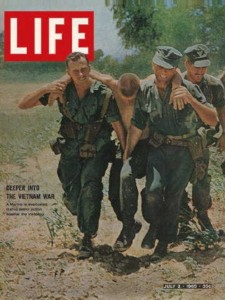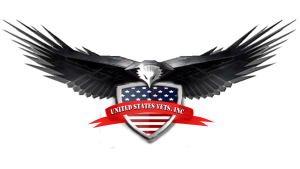Vietnam. A controversial war abroad manifested itself into controversy at home. It was this writer’s first experience with Vietnam Vets when I was young. The commercials I remember were “Don’t forget, hire the vet” and, having no one in my family who served there, images of the war were shielded from me, as the evening news televised horrific reports and atrocities. Television dials in many households turned to the antics of Rocky and Bullwinkle rather than face the ugliness of the issues. In the real world, the Vietnam veteran image was negative. It appeared the country had gone from Jimmy Stewart to Jimi Hendrix before its eyes.
The era ushered in a new set of veterans, so very different from those who served in WWII. The heroes  from the war were dealing with experiences that couldn’t or wouldn’t be addressed. Returning to a culture and society enraged by government and military, drug use and social uprising, understanding and confronting their dilemma was sadly displaced. Young men and women, over two million, were approached as the “enemy” on their own turf by many who turned a blind eye to their issues. Many veterans in this country were even reluctant to wear their uniforms after serving due to the negative atmosphere. The trenches on the battlefields were not only in Vietnam, they were at home as well. Between the combat and firestorms that killed millions, veterans returned scarred and savaged from this war only to face the struggles ahead.
from the war were dealing with experiences that couldn’t or wouldn’t be addressed. Returning to a culture and society enraged by government and military, drug use and social uprising, understanding and confronting their dilemma was sadly displaced. Young men and women, over two million, were approached as the “enemy” on their own turf by many who turned a blind eye to their issues. Many veterans in this country were even reluctant to wear their uniforms after serving due to the negative atmosphere. The trenches on the battlefields were not only in Vietnam, they were at home as well. Between the combat and firestorms that killed millions, veterans returned scarred and savaged from this war only to face the struggles ahead.
Distractions like the Civil Rights Movement only lent insult to injury to many black veterans who found themselves in more than one struggle. A study by the National Vietnam Veterans Readjustment Survey stated 15.2 percent of male vets and 8.1 percent of women who served in that theater were diagnosed with PTSD. Half of those male vets suffering with PTSD have been incarcerated or arrested at least once. VA studies also concur that approximately one third, both men and women, had suffered the depilating mental and emotional scourge. Chemical exposure and the horrors of war deeply impacted the minds and psyche of these individuals. The term “shell-shocked” is now Post Traumatic Stress Disorder (PTSD).
 Agent Orange – The risks multiplied as the use of herbicides and chemicals in Southeast Asia exposed the men and women to a cornucopia of illnesses that needed attention when they returned state side. DDT was banned in the U.S. by ’72 after years of legal embroilment between the manufacturers and the EPA. The chemical compositions (that only a physicist could explain) were blatantly used during the war to clear foliage as well as to control malaria and cholera, which was rampant in the jungle environment. This included The Pink Rose test program which targeted areas in Vietnam and were sprayed multiple times with defoliation and drying agents by the servicemen.
Agent Orange – The risks multiplied as the use of herbicides and chemicals in Southeast Asia exposed the men and women to a cornucopia of illnesses that needed attention when they returned state side. DDT was banned in the U.S. by ’72 after years of legal embroilment between the manufacturers and the EPA. The chemical compositions (that only a physicist could explain) were blatantly used during the war to clear foliage as well as to control malaria and cholera, which was rampant in the jungle environment. This included The Pink Rose test program which targeted areas in Vietnam and were sprayed multiple times with defoliation and drying agents by the servicemen.
Displaced by society and a government who did not understand this new type of vet lead to chronic disappoints and failures that subsequently hit the hero hard. Substance abuse, homelessness, anxiety disorders resulted in crime related-issues and offered nothing more than a bleak and tormenting future.
The Vietnam veteran community felt abandon and discounted.
Korea – Many of these veterans were displaced as well. A war that lasted from 1950 to 1955 was quickly succeeded by the Vietnam War in 1964. There were 6.8 million American men and women who served. They became known as the Cold War Veterans, sandwiched between the WWII and the Vietnam vets.
The Stats – National statistics claim 9,087,000 military personnel served on active duty during the Vietnam Era, August 5, 1964 to May 7, 1975. An additional 50,000 served there from ’60 to ’64. Over 7400 women served and 83% were nurses. The 61% of men killed were under the age of 21. Shockingly, amputations and lower extremity wounds were 300% higher in comparison to WWII and 70% hirer than their Korean veteran compatriots.
These veterans continue to face many of these issues. The lingering memories and image factor still has a stigma. Misunderstood and misplaced, Vietnam vets still struggle with many of the hurdles they encountered forty years ago.
Please join us on Wednesday April 13 for The Voice of Vietnam Vets at  the Common on Garden Lake, 1065 Garden Lake Parkway, Toledo for an evening of discussion and information sharing with a Vietnam veteran panel to address the continuing struggles of the Vietnam Veteran. The one hour program begins at 6:00 pm and registration is not necessary. It is open to all veterans and the public.
the Common on Garden Lake, 1065 Garden Lake Parkway, Toledo for an evening of discussion and information sharing with a Vietnam veteran panel to address the continuing struggles of the Vietnam Veteran. The one hour program begins at 6:00 pm and registration is not necessary. It is open to all veterans and the public.
Please continue to follow our blog for more stories about the Vietnam veterans and how our organization is reaching out to our military heroes.
